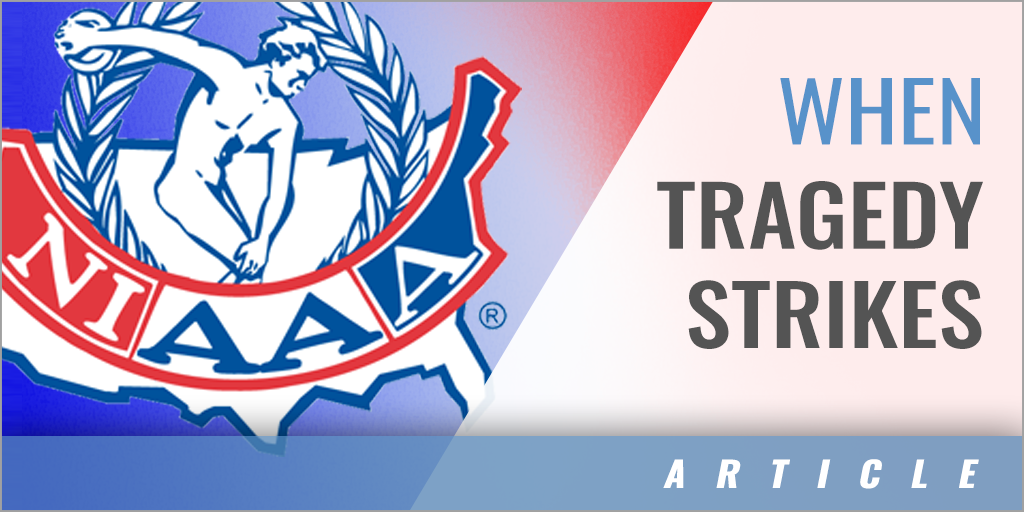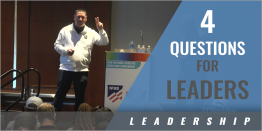|
By: Scott Nordi, CAA – Tacoma, Washington No coach or athletic director is ever prepared to deal with the loss of a student athlete, whether from a sudden unexpected accident or illness, much less when one of our young people chooses to take his or her own life. I know I wasn't, but that is exactly what I faced less than a month into a recent school year. The phone rang at about 8:45 p.m. on a Tuesday evening. We had no home events, and it was a rare night home with family. The call was not uncommon, as my coaches often call to update me on how a contest concluded or to give me details from a practice so that I can be as informed as possible going into the morning. The content of this call was uncommon. It was my Assistant Principal calling. "Scott, are you sitting down?" I remember that question as though it was yesterday. "What's wrong?" was my reply. "Name Redacted, (We will call him "John" for our purposes here) one of our golfers, committed suicide this evening." Immediately my mind raced in a million directions and was lost in the information that was just dropped on me. "I need you to contact the golf coaches and inform them. Can you do that?" I told him I would take care of it and that I would be in early in the morning so that we could make a plan and pull the golf team in first thing to inform them. The next hour was one of the longest and toughest I have ever experienced. How do you call your coaches and inform them that one of their kids was no longer with us, and that it was at his own hand? Needless to say, the calls to the coaches were very emotional, and the word had spread even before I contacted them. My first call was to our boys' coach, and he was in disbelief at first. We proceeded to talk and figure out our next steps with the team. I arranged for him to come straight to school in the morning so that he could be here with his golfers. He does not work in our building so there were some coverage details that I would need to work out, but I assured him they would be taken care of and that he needed to be here where he and his team could get the support they now needed. Next, I needed to inform our girls' coach who does work in the building. He too had already heard the news, so this was more of a confirmation call than anything. We talked about what the morning would look like and what kind of support the boys and girls would need, as well as the coaches. It was agreed we would all meet in my office at 7:00 a.m. to plan our next steps. It was clear that we would need to pull all of our golfers first thing and get them all into a room where we could safely inform them that one of their teammates would no longer be with them. We had grief counselors on hand to support all of us, but who would inform the kids? That fell on my shoulders; after all, I was the athletic administrator and, surely, I had training to deal with this sort of situation. Not so. This isn't something that is "in the manual." I had never stood in front of a group of kids and had to tell them this kind of news. I knew I could not provide much detail, nor would I have any answers for them, but nonetheless, I stood in front of both squads, tears in my eyes. I began, "We called you all in here..." I paused, then collected myself as best I could and proceeded to tell them that their teammate, John, was no longer with us. Blank faces stared back at me as they processed the information. I said I really could not give them much detail and that I didn't have many answers for them. I let them know it was okay to be upset and that we, the coaches and I, were here for them and would continue to be. I let them know we had additional support for them and that they could stay here with us for as long as was needed. The kids were upset, the coaches were upset, and now the entire school was hearing the news. John was an involved kid with many friends, not only the team, but many others would be upset. We continued to work that morning with the golfers. We contacted all of their parents to let them know of the loss and that they should talk with their student-athlete tonight when they come home. We encouraged all of the kids to talk with their parents about what they were feeling. Some wanted to go home, we would accommodate that request, but only if there was someone at home that we could verify before they could leave. We did not want any student going home alone, not in the state of mind they were in. We had made a decision to cancel golf practice for the day and our scheduled matches the next day. We all needed time to be together and to lean on each other. Once the initial shock subsided, I went into professional mode and had to take care of the logistical details. I informed the golf course that we would not be there for practice and that I had postponed the matches scheduled for the next day. I drafted an email which would be sent to all of our golf parents letting them know that we would not hold practice today, explaining the coaches and kids needed some time, and that we had postponed the match for tomorrow, and we would hold a short practice instead. We felt it was important to bring them all back together the next day, to get them moving forward again as soon as possible, after they had some time to cope with the loss. I outlined the remainder of the week for them and provided them with some additional resources and my contact information so that our parents could support their kids and contact me, should they feel the need to do so. I had to inform our opponent that we would need to postpone the matches so they could let their coaches and athletes know. Transportation had to be rearranged as well. In a way, it helped to take care of these details as it kept my mind off of the tragedy we were facing. The remainder of that day our building had a somber feel. Things had to continue, the educational process had to go on and so did practices and competitions for our other sports. But how would this impact the other athletes? I knew many of them were friends with John and/or the other golfers, so I felt I needed to inform all of our coaches to be extra vigilant in regard to the mental state of their student athletes. I drafted another email for them, which included additional resources they could share with anyone affected and asked that they send me names of any athletes that they felt might need some additional support. I made a point of getting to every practice and competition that day. I checked in personally with every coach to make sure things were okay. It became clear that this was having an impact on everyone and that there would be others needing additional support. By morning, I had a list of about thirty kids that coaches had sent me, as they felt they may need some additional time and support. I called each of them down individually to my office and we sat and talked. Some cried, some had questions that I could not answer, and others were just appreciative of being checked-in on. I let them all know that their coaches, at my request, sent me their names out of concern. It was important that they all knew that we cared and were here for them. Those conversations were hard and some continue to this day. The situation isn't one that just goes away in a day. Actually, my relationship with those athletes became stronger and the parental support I received from many of their parents was heartfelt and gratifying. They knew I, and many others at the school and beyond, cared about their kid. The next day continued to be busy. I needed to be at golf practice after school, to support those kids and coaches. We had home soccer and volleyball games that night, and a request had already come from one of our volleyball players, who was close to John, asking if we could hold a moment of silence prior to the game. This needed approval from my Principal and Superintendent. We drafted a statement that could be read and sent it up the administrative chain for approval. We were granted approval and had the statement read prior to the National Anthem at all of our remaining sporting events that week. This was well-received by everyone in attendance at these events and provided some sense of relief for those who were close to the situation. The support from the athletic directors and coaches in our league was outstanding and we were able to get both matches rescheduled. There was an outpouring of concern and support, and as the word spread, people from around the Tacoma/Seattle area, and the state, contacted me to make sure we were as good as could be, knowing we were in a tough situation. When tragedy strikes, how will you respond? I do not wish to go through this again and hope that none of you are ever faced with having to deal with something like this. But the reality is, most likely one of us will be faced with something like this in the future. It has made me a stronger person and forced me into a role I was unfamiliar and uncomfortable with. My coaches and student-athletes saw another side of me. They saw my emotion, my tears, and my feelings. It has brought many of us closer and those kids know that they can be open with me and that I am here for them when they stop and check in with me. One of the athletes even said they stop in to check on me, too. We continue to heal and work through the pain of losing a young life together. There are no answers, and there is not much more that I can do, other than to be there for them and to continue to show them that I care. |







